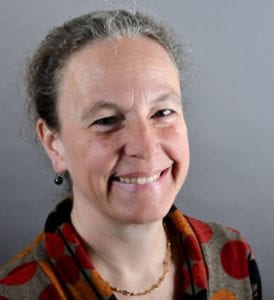 UMass Boston Gerontology associate professor Kathrin Boerner has spent much of her career researching a wide range of end-of-life issues. She was recently interviewed by MyRoche, a publication of the global health care company Roche Holding AG, about her work. The following transcript of the interview with MyRoche editor-in-chief Rebekka Schnell was first published in January.
UMass Boston Gerontology associate professor Kathrin Boerner has spent much of her career researching a wide range of end-of-life issues. She was recently interviewed by MyRoche, a publication of the global health care company Roche Holding AG, about her work. The following transcript of the interview with MyRoche editor-in-chief Rebekka Schnell was first published in January.
Q: Why are you so focused on death?
Kathrin Boerner: Many people do indeed ask me about my concern with such depressing matters. But I don’t see it like that at all. I work on a topic that affects everyone, and that’s what makes it so relevant. What is more, it is fantastic to see the capacity people have to cope with terrible loss, and to help those who aren’t doing so well.
Q: Let’s talk about grieving. Many of us have encountered Elisabeth Kübler- Ross’s stages of grief at some point or another …
KB: Yes, this model is practically unavoidable. Kübler-Ross believed that the grieving process always unfolds in specific stages. First you deny the loss, then you get angry, then sad and depressed, and finally you accept what has happened. However, research has repeatedly shown that there is in fact no such universal grieving process. Grieving can take very different forms, some of which are problematic. And in those cases, people need help because they are unable to overcome the loss.
Q: What distinguishes ‘problematic’ from ‘normal’ grief?
KB: Traditionally, it was always thought that there must be a phase of intense grief in which a person feels utterly miserable. That’s why psychoanalysts speak about the ‘work of mourning’ or ‘grief work’. Many studies have shown, however, that there is a fairly large group of people who, although they do grieve, are not completely devastated by loss. If someone was relatively stable before a loss, there is a good chance that they will be able to cope with the experience. According to conventional thinking, that would be concerning; if that person isn’t suffering, there must be something wrong. As a result, the wrong people were identified as ‘alarming’ and those who were suffering most of all were thought to be grieving ‘properly’. Often, however, it is precisely these people who are unable to overcome their grief. They don’t just mourn for longer—they experience a different kind of grief from the outset.
Q: In what sense?
KB: On the one hand they can’t stop thinking about the loss, and on the other they go to extremes to avoid anything at all that reminds them of the person they have lost. They may stop going to their usual holiday destination, for example, or steer clear of their favorite restaurant. Their world gets smaller and smaller because they avoid anything that could cause them pain, but at the same time they think about that pain constantly.
Q: What helps family members most of all when they lose someone?
KB: To know that their loved one died ‘a good death’ is extremely comforting. Conversely, it can be traumatic if bad things happened to the person while they were dying, such as being fitted with feeding tubes or resuscitated because they hadn’t drawn up an advance healthcare directive. That sort of experience is something people really dwell on.
Q: How well are most people prepared for death?
KB: Extremely badly. Medical advances are a blessing, but they also pose risks— for instance that a person’s life might be extended in a questionable manner against their wishes because they were never asked what they actually wanted. What most of us fear most is not death itself, but the process of dying: Will I be in pain? Will somebody be with me? Due to their fear of talking about death, people miss out on the chance to shape this process. And that also makes an enormous difference for the time afterwards. If someone died a good death and felt well looked-after, then that can be a great source of strength and solace for grieving loved ones.
Q: How should we act towards those who have suffered a loss?
KB: Many people remain silent for fear of saying the wrong thing or bringing up painful memories. But based on both studies and personal experience, I know that the bereaved are always grateful when people talk to them. Just imagine how isolated someone who suffered a terrible loss must feel when everyone around them avoids the subject. Some people in our studies still recalled many years later how a work colleague had hugged them and said a few words to them; they still remember this because they are grateful. Speaking about the topic of death more openly can only benefit us as a society.

Leave a Reply